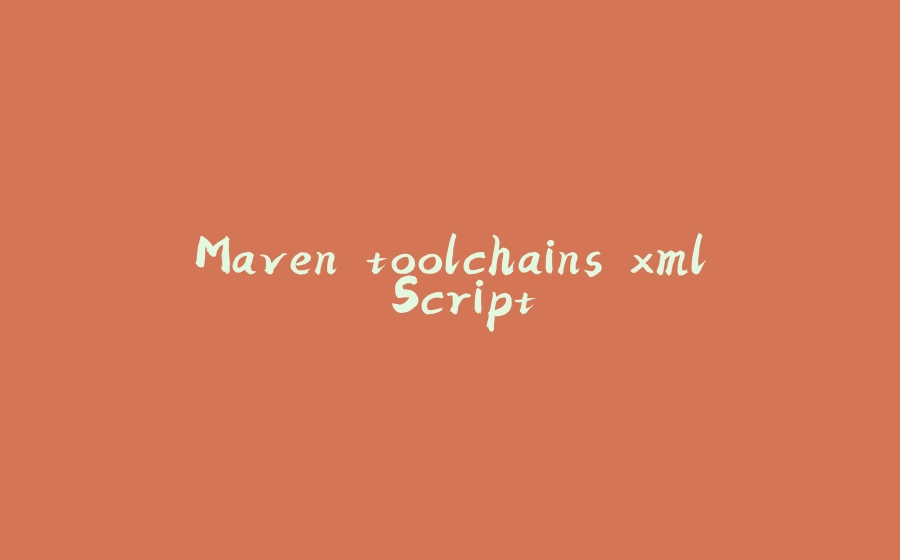Apache Maven has introduced Maven Toolchains to ease configuring plug-ins and to avoid specifying any JDK location in the project POMs. Available JDKs are configured in ${HOME}/.m2/toolchains.xml. This article introduces a script to automate the generation of the toolchains.xml file, toolchains.xml.bash.
Theory of Operation
The toolchains.xml file contains a <toolchain/> element for each configured JDK.
<?xml version="1.0" encoding="UTF-8"?>
<toolchains>
...
<toolchain>
<type>jdk</type>
<provides>
<version>VERSION</version>
<vendor>VENDOR</vendor>
</provides>
<configuration>
<jdkHome>JDKHOMEDIR</jdkHome>
</configuration>
</toolchain>
...
</toolchains>
Enter fullscreen mode Exit fullscreen mode
For each JDKHOMEDIR candidate, the VERSION is specified by the JVM system property java.specification.version and a consistent vendor name is specified by java.vendor. This simple Java program (compatible with Java 1.5 and later) will provide the template. (The JDK directory must be supplied as a command line argument.)
public class ToolchainEntry {
public static void main(String[] argv) {
System.out
.format(" <toolchain>\n")
.format(" <type>jdk</type>\n")
.format(" <provides>\n")
.format(" <version>%s</version>\n",
System.getProperty("java.specification.version"))
.format(" <vendor>%s</vendor>\n",
System.getProperty("java.vendor"))
.format(" </provides>\n")
.format(" <configuration>\n")
.format(" <jdkHome>%s</jdkHome>\n", argv[0])
.format(" </configuration>\n")
.format(" </toolchain>\n");
}
}
Enter fullscreen mode Exit fullscreen mode
This program is combined with a bash script in the next section.
Script
A bash script is used to drive the execution of the Java program described in the previous section with responsibilities to:
- Identify the candidate JVM directories:
- Mac OS X (Darwin):
/Library/Java/JavaVirtualMachines/*.jdk/Contents/Home - Linux:
/usr/lib/jvm/*jdk*
- Mac OS X (Darwin):
- Create
Toolchain.javaand compile toToolchain.class1 - Create a new
<toolchains/>document and iterate therough each candidate JDK directory executingToolchain.classwith the candidate JVM
#!/bin/bash
shopt -s nullglob
JDKS+=({/Library/Java/JavaVirtualMachines/*.jdk/Contents/Home,/usr/lib/jvm/*jdk*})
cat > ToolchainEntry.java <<EOF public class ToolchainEntry { public static void main(String[] argv) { System.out .format(" <toolchain>\n") .format(" <type>jdk</type>\n") .format(" <provides>\n") .format(" <version>%s</version>\n", System.getProperty("java.specification.version")) .format(" <vendor>%s</vendor>\n", System.getProperty("java.vendor")) .format(" </provides>\n") .format(" <configuration>\n") .format(" <jdkHome>%s</jdkHome>\n", argv[0]) .format(" </configuration>\n") .format(" </toolchain>\n"); } } EOF javac -Xlint:none -source 1.7 -target 1.7 ToolchainEntry.java
echo '<?xml version="1.0" encoding="UTF-8"?>' > toolchains.xml
echo '<toolchains>' >> toolchains.xml
for jdk in ${JDKS[@]}; do if [ -d ${jdk} ]; then java=${jdk}/bin/java
if [ -x ${java} ]; then
${java} ToolchainEntry ${jdk} >> toolchains.xml
fi fi done echo '</toolchains>' >> toolchains.xml
rm -rf ToolchainEntry.*
Enter fullscreen mode Exit fullscreen mode
Output
Example generated toolchains.xml files for Mac OS X and Linux (Google Cloud Shell) are provided below.
<?xml version="1.0" encoding="UTF-8"?>
<toolchains>
<toolchain>
<type>jdk</type>
<provides>
<version>10</version>
<vendor>AdoptOpenJDK</vendor>
</provides>
<configuration>
<jdkHome>/Library/Java/JavaVirtualMachines/adoptopenjdk-10.jdk/Contents/Home</jdkHome>
</configuration>
</toolchain>
<toolchain>
<type>jdk</type>
<provides>
<version>11</version>
<vendor>AdoptOpenJDK</vendor>
</provides>
<configuration>
<jdkHome>/Library/Java/JavaVirtualMachines/adoptopenjdk-11.jdk/Contents/Home</jdkHome>
</configuration>
</toolchain>
<toolchain>
<type>jdk</type>
<provides>
<version>12</version>
<vendor>AdoptOpenJDK</vendor>
</provides>
<configuration>
<jdkHome>/Library/Java/JavaVirtualMachines/adoptopenjdk-12.jdk/Contents/Home</jdkHome>
</configuration>
</toolchain>
<toolchain>
<type>jdk</type>
<provides>
<version>1.8</version>
<vendor>AdoptOpenJDK</vendor>
</provides>
<configuration>
<jdkHome>/Library/Java/JavaVirtualMachines/adoptopenjdk-8.jdk/Contents/Home</jdkHome>
</configuration>
</toolchain>
<toolchain>
<type>jdk</type>
<provides>
<version>9</version>
<vendor>Oracle Corporation</vendor>
</provides>
<configuration>
<jdkHome>/Library/Java/JavaVirtualMachines/adoptopenjdk-9.jdk/Contents/Home</jdkHome>
</configuration>
</toolchain>
<toolchain>
<type>jdk</type>
<provides>
<version>11</version>
<vendor>Amazon.com Inc.</vendor>
</provides>
<configuration>
<jdkHome>/Library/Java/JavaVirtualMachines/amazon-corretto-11.jdk/Contents/Home</jdkHome>
</configuration>
</toolchain>
<toolchain>
<type>jdk</type>
<provides>
<version>12</version>
<vendor>Oracle Corporation</vendor>
</provides>
<configuration>
<jdkHome>/Library/Java/JavaVirtualMachines/jdk-12.0.2.jdk/Contents/Home</jdkHome>
</configuration>
</toolchain>
<toolchain>
<type>jdk</type>
<provides>
<version>1.7</version>
<vendor>Oracle Corporation</vendor>
</provides>
<configuration>
<jdkHome>/Library/Java/JavaVirtualMachines/jdk1.7.0_80.jdk/Contents/Home</jdkHome>
</configuration>
</toolchain>
<toolchain>
<type>jdk</type>
<provides>
<version>1.8</version>
<vendor>Oracle Corporation</vendor>
</provides>
<configuration>
<jdkHome>/Library/Java/JavaVirtualMachines/jdk1.8.0_201.jdk/Contents/Home</jdkHome>
</configuration>
</toolchain>
<toolchain>
<type>jdk</type>
<provides>
<version>1.8</version>
<vendor>Oracle Corporation</vendor>
</provides>
<configuration>
<jdkHome>/Library/Java/JavaVirtualMachines/jdk1.8.0_202.jdk/Contents/Home</jdkHome>
</configuration>
</toolchain>
</toolchains>
Enter fullscreen mode Exit fullscreen mode
<?xml version="1.0" encoding="UTF-8"?>
<toolchains>
<toolchain>
<type>jdk</type>
<provides>
<version>11</version>
<vendor>Debian</vendor>
</provides>
<configuration>
<jdkHome>/usr/lib/jvm/java-1.11.0-openjdk-amd64</jdkHome>
</configuration>
</toolchain>
<toolchain>
<type>jdk</type>
<provides>
<version>11</version>
<vendor>Debian</vendor>
</provides>
<configuration>
<jdkHome>/usr/lib/jvm/java-11-openjdk-amd64</jdkHome>
</configuration>
</toolchain>
<toolchain>
<type>jdk</type>
<provides>
<version>1.8</version>
<vendor>Oracle Corporation</vendor>
</provides>
<configuration>
<jdkHome>/usr/lib/jvm/java-1.8.0-openjdk-amd64</jdkHome>
</configuration>
</toolchain>
<toolchain>
<type>jdk</type>
<provides>
<version>1.8</version>
<vendor>Oracle Corporation</vendor>
</provides>
<configuration>
<jdkHome>/usr/lib/jvm/java-8-openjdk-amd64</jdkHome>
</configuration>
</toolchain>
</toolchains>
Enter fullscreen mode Exit fullscreen mode
[1]Even though the earliest Java version supported by the java source is 1.5, the earliest code Oracle’s JDK 12 can produce is for 1.7.
↩























暂无评论内容